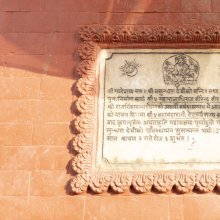Aishvarya, Aiśvarya: 24 definitions
Introduction:
Aishvarya means something in Buddhism, Pali, Hinduism, Sanskrit, Jainism, Prakrit, Hindi. If you want to know the exact meaning, history, etymology or English translation of this term then check out the descriptions on this page. Add your comment or reference to a book if you want to contribute to this summary article.
Aishvarya has 23 English definitions available.
The Sanskrit term Aiśvarya can be transliterated into English as Aisvarya or Aishvarya, using the IAST transliteration scheme (?).
Alternative spellings of this word include Eswary.
Images (photo gallery)
Languages of India and abroad
Sanskrit dictionary
[Deutsch Wörterbuch]
Source: Cologne Digital Sanskrit Dictionaries: Böhtlingk and Roth Grosses Petersburger WörterbuchAiśvarya (ऐश्वर्य):—(wie eben) n. Vermögen, Macht, Majestät, übernatürliche Kraft; Herrschaft, Oberherrlichkeit: sarvāsu devatāsvaiśvaryaṃ vidyate [Yāska’s Nirukta 8, 2.] [Manu’s Gesetzbuch 4, 232.] [Bhagavadgītā 2, 43.] [Suśruta 1, 317, 1.] aiśvaryasthāste na śakyā draṣṭum [2, 382, 15.] [Rāmāyaṇa 3, 35, 8.] [SĀṂKHYAK. 23. 45.] mamāṣṭaguṇamaiśvaryaṃ dattaṃ bhagavatā purā [Mahābhārata 13, 1333.] [Bhāgavatapurāṇa 3, 25, 37.] [Amarakoṣa 1, 1, 1, 31.] aufgezählt [Hemacandra’s Abhidhānacintāmaṇi 202.] Von fünf übernatürlichen Kräften in Bezug auf die fünf Elemente wird gesprochen [Harivaṃśa 11734. fgg. -] [Yāska’s Nirukta 1, 3. 3, 11.] [Manu’s Gesetzbuch 8, 313.] [Nalopākhyāna 17, 15.] aiśvaryātpracyutaḥ [9, 18.] aiśvaryeṇa vihīnasya [Rāmāyaṇa 4, 3, 13.] aiśvaryamatta [Śākuntala 66, 4.] sarvāsāṃ viśāmaiśvaryamādhipatyaṃ gacchati [The Śatapathabrāhmaṇa 13, 4, 3, 15. 2, 7, 13.] vānarāṇām über die Affen [Rāmāyaṇa 5, 18, 32.] lokānām [2, 31, 5.] tāsāṃ tvamaiśvaryaṃ kuru [5, 22, 31.] aiśvaryaṃ ca viśālāyāṃ pṛthivyām [36, 60.] viśvaiśvarya [ŚVETĀŚV. Upakośā 1, 11.] dhanaiśvarya (Kuvera's) [Manu’s Gesetzbuch 7, 42.] niśācaraiśvarya [Raghuvaṃśa 12, 69.] mit dem subj. compon.: putraiśvarye unter der Herrschaft des Sohnes [Manu’s Gesetzbuch 6, 95.]
--- OR ---
Aiśvarya (ऐश्वर्य):—fuge noch der Stand eines grossen, reichen Herrn und [Spr. 581. 3854. fgg.] hinzu. Uebernatürliche Macht [SARVADARŚANAS. 76,4. 77,11. fg. 117,21.] [Oxforder Handschriften] [?51,a,11; vgl. Nalopākhyāna 1.] Herrschaft so v. a. Reich: ehi madaiśvarye tvaṃ nivasa [Kathāsaritsāgara 111, 104.]
Source: Cologne Digital Sanskrit Dictionaries: Sanskrit-Wörterbuch in kürzerer FassungAiśvarya (ऐश्वर्य):—n. —
1) der Stand eines grossen Herrn. Herrschaft. Oberherrlichkeit über (Gen. , Loc. oder im Comp. vorhergehend). putraiśvarye unter der Herrschaft des Sohnes. —
2) eine übernatürliche Kraft. —
3) Herrschaft , so v.a. Reich.
Sanskrit, also spelled संस्कृतम् (saṃskṛtam), is an ancient language of India commonly seen as the grandmother of the Indo-European language family (even English!). Closely allied with Prakrit and Pali, Sanskrit is more exhaustive in both grammar and terms and has the most extensive collection of literature in the world, greatly surpassing its sister-languages Greek and Latin.
See also (Relevant definitions)
Starts with (+4): Aishvaryagarvita, Aishvaryagedi, Aishvaryaguna, Aishvaryajnana, Aishvaryakadambini, Aishvaryakarini, Aishvaryalakshmi, Aishvaryalobha, Aishvaryamatta, Aishvaryapriya, Aishvaryasangraha, Aishvaryashakti, Aishvaryasukha, Aishvaryavade, Aishvaryavajra, Aishvaryavajri, Aishvaryavamta, Aishvaryavamte, Aishvaryavant, Aishvaryavat.
Ends with (+6): Anaishvarya, Ashtaishvarya, Atmaishvarya, Brahmaishvarya, Dhanaishvarya, Ekaishvarya, Gataishvarya, Hritaishvarya, Lokaishvarya, Mahaishvarya, Naishvarya, Naraishvarya, Paramaishvarya, Putraishvarya, Puttraishvarya, Rajaishvarya, Rudraishvarya, Sadashivaishvarya, Sarvaishvarya, Siddhaishvarya.
Full-text (+61): Savadya, Anaishvarya, Aishvaryavant, Aisiri, Aisuri, Bhagavat, Aishvari, Aisiriya, Aishvariya, Aishvaryavivarana, Aishvaryakadambini, Aishvaryavat, Aiccuvariyam, Ayiccuriyam, Kacentiraicuvariyam, Aishvaryamatta, Isariya, Esajja, Makataicuvariyam, Triyugma.
Relevant text
Search found 54 books and stories containing Aishvarya, Aiśvarya, Aisvarya; (plurals include: Aishvaryas, Aiśvaryas, Aisvaryas). You can also click to the full overview containing English textual excerpts. Below are direct links for the most relevant articles:
The Linga Purana (by J. L. Shastri)
Chapter 88 - Review of Pāśupata yoga < [Section 1 - Uttarabhāga]
Chapter 90 - The expiatory rites of the ascetics (yati-prāyaścitta) < [Section 1 - Uttarabhāga]
Chapter 27 - Worship of Liṅga (liṅgārcana) < [Section 1 - Uttarabhāga]
Samkhya thoughts in the Mahabharata (by Shini M.V.)
Mahat (synonym of Buddhi) < [Chapter 2 - The Principles of Sāṃkhya Philosophy]
Vṛtra-gītā (Summary) < [Chapter 3 - The Philosophical Tenets in the Śānti-parva]
Liberation (Mukti or Kaivalya) < [Chapter 2 - The Principles of Sāṃkhya Philosophy]
Srila Gurudeva (The Supreme Treasure) (by Swami Bhaktivedanta Madhava Maharaja)
Difference between Aiśvarya and Mādhurya < [Chapter 2.12 - Early ISKCON Conversations with Śrīla Gurudeva]
The Mercy of a Rasika Vaiṣṇava < [Chapter 2.4 - The Uttamā Bhāgavata and Kṛpa-Pātra]
The Glory of Gauḍīya Guru-paramparā < [Chapter 2.1 - Śrī Guru Tattva and Śrī Guru-sevaka]
The Skanda Purana (by G. V. Tagare)
Chapter 260 - Greatness of Siddheśvara (Siddha-īśvara) < [Section 1 - Prabhāsa-kṣetra-māhātmya]
Chapter 301 - Greatness of Siddheśvara (Siddha-īśvara) < [Section 1 - Prabhāsa-kṣetra-māhātmya]
Chapter 4 - Worshipping the Conch < [Section 5 - Mārgaśīrṣa-māhātmya]
Garga Samhita (English) (by Danavir Goswami)
Verse 6.20.10 < [Chapter 20 - In the Description of the Second Fort, the Glories of Indra-tīrtha, etc.]
Brihad Bhagavatamrita (commentary) (by Śrī Śrīmad Bhaktivedānta Nārāyana Gosvāmī Mahārāja)
Verse 2.3.53 < [Chapter 3 - Bhajana (loving service)]
Verse 2.2.221 < [Chapter 2 - Jñāna (knowledge)]
Verse 2.2.20-21 < [Chapter 2 - Jñāna (knowledge)]
Related products

